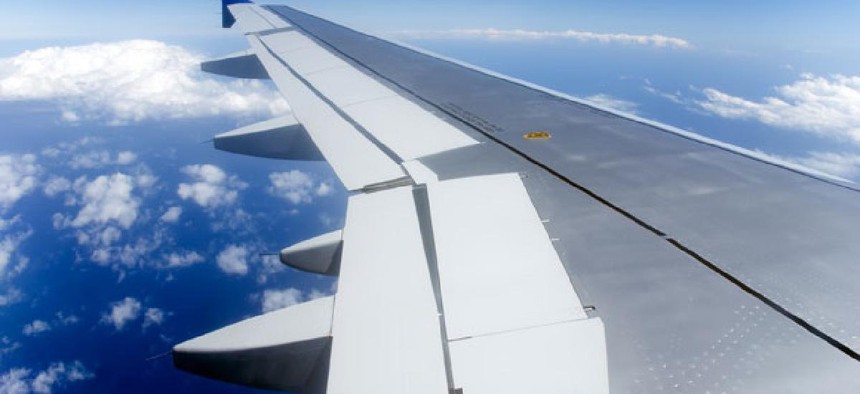
PhotoXpress
Looser Rules on Airline Passenger Electronics May Take Flight
Leaked advisory board draft report favors easing 'Please stow away your devices' drill.
The Federal Aviation Administration early this fall is expected to receive a long-awaited advisory board report recommending that the government ease the unpopular safety requirement that all airline passengers turn off their personal electronic devices during takeoffs and landings.
As reported in a front-page Wall Street Journal story on Friday, a high level 28-member group of experts in July is preparing to argue that devices such as iPods, DVD players, game devices and tablets are not the threat to airline crew communications they were long thought to be below 10,000 feet. The issue of cellphones, however, remains controversial, and the draft report makes no recommendation on loosening the ban on mobile phones.
“As the consumer electronics industry has exploded,” the draft report reads, the FAA’s past approach of giving each airline flexibility in gauging the safety of specific devices “has become untenable.” Surveys show that as many as a third of all passengers have ignored the prohibition.
The Journal cautions that the report is only a draft and could change.
The FAA in a statement said it “recognizes consumers are intensely interested in the use of personal electronics aboard aircraft. That is why we tasked a government-industry group to examine the safety issues and the feasibility of changing the current restrictions. At the group's request, the FAA has granted a two-month extension to complete the additional work necessary for the safety assessment. We will wait for the group to finish its work before we determine next steps.”
Katie Connell, managing director of public relations and communications for the industry group Airlines for America, told Government Executive, “We look forward to the final report and working cooperatively with the FAA to safely expand customer use of electronic devices in flight.”
Disgruntlement with the policy has been heard from consumers as well as lawmakers. In April, FAA Administrator Michael Huerta was lectured at a budget hearing by Sen. Claire McCaskill, D-Mo., who scoffed at the alleged risk posed by passenger electronics and denied that they were a distraction from the flight attendants’ safety lectures, according to a report in USAToday., because the crew doesn’t insist that passengers put down their copies of "War and Peace."
Sen. John Thune, R-S.D., said, "It seems like these are rules for rules' sake that sometimes go beyond what is even practical, let alone what is safe.” Heurta replied that it is difficult to implement a policy that requires airlines to differentiate among different types of devices. FAA policy is based on concern that some devices may interfere with aircraft navigation equipment.
But the lead agency with final approval for revising the restrictions -- which go back to 1966 -- is the Federal Communications Commission. The FCC is not commenting on the advisory board report before its final release.
In a December letter to Huerta, then-FCC Chairman Julius Genachowski urged the FAA “to enable greater use of tablets, e-readers, and other portable electronic devices during flight, consistent with public safety, guidance and procedures regarding the use of such devices.” The FAA’s review, the chairman continued, “comes at a time of tremendous innovation as mobile devices are increasingly interwoven in our daily lives. They empower people to stay informed and connected with friends and family, and they enable both large and small businesses to be more productive and efficient, helping drive economic growth and boost U.S. competitiveness.”
FCC rules prohibit the use of cellphones using the 800 MHz frequency “because of potential interference to wireless networks on the ground,” says the FCC’s website. In March 2007, the FCC terminated a proceeding that it began in late 2004 to consider potentially lifting this ban. “The FCC determined that the technical information provided by interested parties in response to the proposal was insufficient to determine whether in-flight use of wireless devices on aircraft could cause harmful interference to wireless networks on the ground. Therefore, it decided at that time to make no changes in the rules prohibiting in-flight use of such devices.”
The FAA in a June 2010 memo to airlines reiterated its procedures on enforcing rules on personal electronic devices, instructing them to monitor use of the devices and enforce restrictions. “If any person refuses to comply with the crewmember’s instructions, after having been advised that their actions are contrary to the operator’s policies and procedures, or regulatory requirements regarding the use of their PED, the crewmember should follow the operator’s procedures and take appropriate actions in response to the noncompliance,” including taking eyewitness statements, the directive states.
This May, the FCC voted to explore a broader use of wireless spectrum available on airplanes in response to commercial enterprises seeking to expand services, which eventually could further increase demand among passengers for in-flight privileges.







